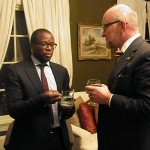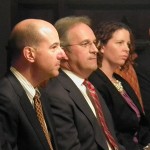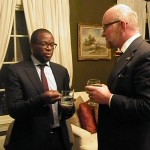IFE Media & Technology Roundtable hosts Mr. David Kappos, Under Secretary of Commerce for Intellectual Property and Director of the United States Patent and Trademark Office.
On November 5th, 2012, South African Ambassador, H.E. Ebrahim Rasool, hosted members of the Institute of Education and guests at his beautiful residence for a Media and Technology Roundtable with featured guest Under Secretary of Commerce for Intellectual Property and Director of the United States Patent and Trademark Office, Mr. David Kappos. Introducing Mr. Kappos, Ambassador Rasool highlighted that “with African eyes and ears,” South Africa is on the lookout for ways to demonstrate how strong intellectual property protections can benefit countries like his.
Mr. Kappos started his remarks by highlighting a number of very positive IP developments involving South Africa. He went on to remind the audience of why intellectual property rights are so important to not just developed countries, but developing countries too. Intellectual property rights allow bright people with good ideas to benefit from their time and effort invested in developing these ideas. This is becoming increasingly important to countries and their innovators as the global marketplace have become more connected. In a world where an idea can be taken and transmitted across the world instantly, the only thing that protects the creator from having their ideas stolen and used without permission is a system of strong national and international intellectual property protections.
Under Secretary Kappos shared the priority the Obama Administration places on innovation, and how that commitment is driving innovators the world over. Nonetheless, he illustrated how the pace of today’s innovation comes with risks, sharing some instances where companies have invested in research and development to produce new inventions actually only to see a net loss due to insufficient IP protection once those products reached the market.
Mr. Kappos argued that, although it is necessary to have a strong intellectual property rights system, it is also important to balance it with appropriate societal considerations. For example, the United States is championing an international legal instrument for the Visually Impaired, and this will be the first instrument under the World Intellectual Property Organization that focuses exclusively on the concept of exceptions and limitations to intellectual property rights. The motivation behind this instrument is that the visually impaired in the US have access to millions of books because there is an active market. But this is not the case for visually impaired people in many other parts of the world where the same access is not available. The instrument for the Visually Impaired isn’t anti-intellectual property rights, but as Mr. Kappos argued, is pro-development and pro-humanity. It is an important step towards making the same opportunities and access to authorships available to the visually impaired across the world.
Mr. Kappos also highlighted other initiatives — a pro-bono intellectual property initiative in the United States — where the USTPO leverages local networks of law school students to represent inventors who may not have the resources to file and defend a patent under the present system. This program has generated much international interest, from Europe to Sub-Saharan Africa. This leading-edge program was the focus of much discussion and praise from Ambassador Rasool and the evening’s participants.
The presentation concluded with a discussion of the “almost existential” debate on the “fitness for purpose” of the intellectual property system, fuelled by the recent smartphone patent disputes. Mr. Kappos argued that the U.S. patent system is, under some definitions, a long-term vehicle, where the American people offer a “downpayment” on tomorrow’s innovations by paying patent fees on today’s technologies. Mr. Kappos argued that while the U.S. has by far the most powerful patent system in the world, and while our country and its citizens also pay the highest royalties on inventions, they also benefit greatly from the fast pace of innovation and technological advancement. The net result is a long-term system that encourages innovations that have immense benefits to the US econom and has the potential to benefit the whole world.
Contributed by Joanne Ke, IFE Fellow.
Click her to review event photos. Click here to review pdf of event Roundup.















